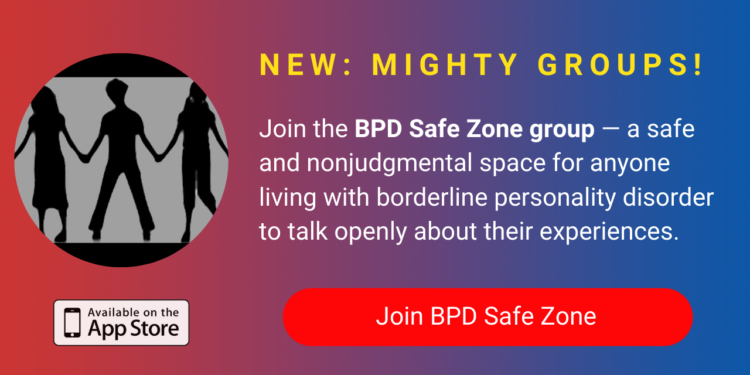What It's Like to Be Borderline in Quarantine
Living with borderline personality disorder (BPD) is difficult. It is exhausting. It is mentally and often physically draining.
And that is at the best of times.
Now, during a global pandemic, forced to spend an indefinite number of weeks on end away from friends and family, it is becoming increasingly difficult to deal with. Not all aspects of BPD are problematic all at once for me personally; the symptoms come in waves and sometimes can last from hours to days. However, with this new, isolated way of life, there are certain problems that have started to trouble me more and more frequently.
Before the UK lockdown, I made significant progress in most aspects of my disorder — admittedly, this is mostly due to the people I consider my closest friends; I became comfortable talking about things I never dared mention before, I felt secure and rarely worried about abandonment. I haven’t lost this progress by any means, though living a primarily isolated life has made certain symptoms of BPD “flair up.” I have decided to talk about them in the hopes that anyone else with similar troubles throughout this lockdown can find comfort in knowing they’re not alone.
1. Loneliness
Chronic loneliness is widely known as one of the most defining symptoms for borderline individuals. Often, even in the happiest of moments surrounded by friends, I find myself with an emptiness in my heart, a feeling as though even though I have all these people around me, am I truly wanted here? It feels as though everyone has somebody they are closer to, or happier around, or more comfortable with and I long for that kind of relationship more than anything. Of course, I do have meaningful, joyful and amazing friendships, but in that moment, it is hard to convince myself otherwise.
Being in isolation has made these thoughts almost impossible to counteract. Usually, if I’m at a party or even watching a movie with friends, I can challenge feelings of loneliness or inadequacy by taking note of people around me; realizing I am interacting with people and they are happy to speak to me and therefore, in this current moment, I am not lonely and I am more than enough for them. Sat in my bedroom alone for the third day in a row is… not so simple.
The only way to interact with loved ones today is over the phone, the only way to keep up to date on their daily lives is via social media. For someone with BPD, this is difficult. It is hard to see your friends interact with other people on social media and not compare how they’ve been interacting with you. It is difficult to not overanalyze every message you receive just in case you’ve been too “clingy,” and they might want a break from you but they don’t know how to tell you. It becomes terrifying to even ask for a catch up over the phone in case they’re secretly rolling their eyes when your name pops up on their screen and hoping that the call is over with fast. It is hard. And often makes the loneliness worse because I choose to distance myself from people out of fear that that’s what they want, and they just can’t find the words to tell me.
2. Fears of abandonment
This leads me into my second point — fear of abandonment. Again, this is something I struggle with on a regular basis although, especially through my last few terms at university, I developed strong friendships with people whom I am certain will not decide to leave me overnight. I count myself extremely lucky for this. Thankfully and after a few long years of work, my abandonment fears do not tend to focus on my closest friends as I am confident that I could talk to them if I ever felt there was an issue that needs to be addressed. My worries, in fact, surround the ending of my university experience.
I know this sounds strange — worried about being abandoned by a university experience? This is not what I mean. I mean I worry about everyone I met that I most likely will never see again, people I never got a chance to say a proper goodbye to. I am worried that there are memories in places I may never go to again or if I do, it will never be the same because there will be a different group of students there and places won’t be full of familiar faces. I worry that I have left the version of myself behind that I worked so hard on developing, I am scared that now I’m back home, I may revert to an old version of myself that I was happy to leave in the past.
All these worries and anxieties have culminated in an elevated fear of abandonment. As I mentioned, these days, this is not in regards to my closest friends — the people I spent the most time with — it is in regards to the people I care for but never got a real chance to let them know. And this was many, many people. I am sure I made friends for life through my time at university and I will never not feel grateful for those people, but I feel a deep sadness for the friends I made that may forget about me within a year or two. These are the people who trigger my fears of abandonment and while I know it is technically not real, true abandonment like I have felt before, it still feels the same. It still feels inescapable, it still feels like a tragic loss and I regret not doing everything I can to stay close with people I fear losing.
Of course, this is life. People come and go, and I have learned to accept that. But when you have a disorder that makes it difficult to cope with people not replying to one simple message, it feels almost impossible to overcome the knowledge that you might never speak to certain people again and even worse to know they may never know how much of an impression they made.
3. Self-harm urges
Potentially the most consistent symptom I experience is self-harm urges/behaviours and this is the symptom I find most difficult to speak about, whether it is to friends or even medical professionals. I have discussed this issue with very, very few people and thankfully, the people I trusted with these problems have been overwhelmingly supportive and non-judgmental. Though opening up about these behaviors does not erase them, it certainly makes them easier to manage if you’re around people who understand and can distract you. These days, I can get through most impulses alone and I am so, so proud of myself because a year ago, this was impossible. However, sometimes when things become a little too much, support from people around you is what can get you through the worst of it.
Unfortunately, being alone almost 24/7 erases a lot of this support by default. Yes, friends and family are available over the phone, something I am eternally grateful for, but because of the above-mentioned issues, self-harm impulses become increasingly prominent. And, also because of above-mentioned issues, it becomes increasingly hard to reach out to loved ones when you are convinced they’re one more teary-eyed phone call away from abandoning you.
When I can think about this with a clear, rational mindset, I think I can safely say I don’t place pressure on my loved ones to help me with this specific problem. In fact, when I reach out for help during times when I have self-harm urges, I rarely mention what is going through my head. I feel a simple conversation is often enough of a distraction and then I can move past it. I think being in quarantine has caused problems for me in terms of self-harm because, while I rarely spoke about it to begin with, there is a new element of fear in that I know it would be more difficult to deal with if I happened to find myself in a more overwhelming state than I am currently used to. Once quarantine is completely lifted, I will take comfort in knowing that a visit to a friend’s house just five minutes away will be enough of a distraction to get me through.
It’s not all bad!
Being in quarantine has made me more aware of myself and while I do still rely on the support of others from time to time (which I believe is normal), I am learning to manage myself better simply because I have no other choice. I have also become more appreciative of my friends — both friends from university and friends in my hometown. I look forward to seeing them once this is over with, I feel full of excitement when I think of being with everyone again, which is something I haven’t felt so intensely for a long time. Mental health has its ups and downs, as does anything else, and with BPD these ups can feel extremely high and the downs can feel extremely low. But there is hope in the fact that the world will return to normality soon enough and I believe I will come out a stronger person than I began.
Photo by Remy_Loz on Unsplash


